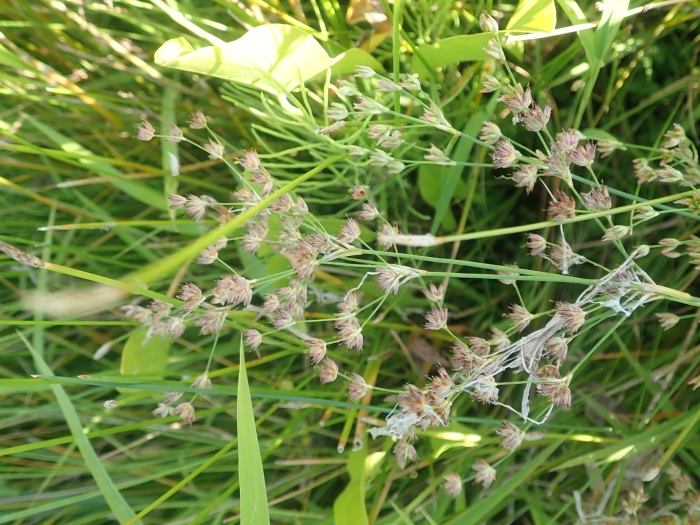Pointed Rush
(Juncus oxymeris)
Pointed Rush (Juncus oxymeris)
/
/

© Nolan Exe
CC BY 4.0
Image By:
© Nolan Exe
Recorded By:
Copyright:
CC BY 4.0
Copyright Notice:
Photo by: © Nolan Exe | License Type: CC BY 4.0 | License URL: http://creativecommons.org/licenses/by/4.0/ | Uploader: fern_friend | Publisher: iNaturalist |























Estimated Native Range
Summary
Juncus oxymeris, commonly known as Pointed Rush, is a perennial herb native to wetland habitats including marshes, wet meadows, and the edges of lakes and streams on the West Coast of North America, from British Columbia to California. It thrives at elevations ranging from 328 to 6562 feet. Pointed Rush typically reaches up to 24 inches in height and spreads through underground rhizomes, forming dense clumps. The plant’s gladiolate leaves are stiff and erect, resembling those of iris or gladiolus, and it produces inconspicuous straw-colored flowers with lanceolate tepals during the summer months. The flowers are not particularly showy, but they do add a subtle texture to the plant’s overall appearance.
Pointed Rush is valued for its ability to stabilize soil and filter water, making it an excellent choice for riparian restoration projects and naturalized water gardens. It is also used ornamentally in bog gardens and as a water’s edge plant. Pointed Rush prefers consistently moist to wet soils and can tolerate a range of light conditions from full sun to part shade. It is relatively low maintenance, but gardeners should be aware that it can spread aggressively in ideal conditions. There are no major disease problems associated with this plant, but it can become invasive if not managed properly in garden settings.CC BY-SA 4.0
Pointed Rush is valued for its ability to stabilize soil and filter water, making it an excellent choice for riparian restoration projects and naturalized water gardens. It is also used ornamentally in bog gardens and as a water’s edge plant. Pointed Rush prefers consistently moist to wet soils and can tolerate a range of light conditions from full sun to part shade. It is relatively low maintenance, but gardeners should be aware that it can spread aggressively in ideal conditions. There are no major disease problems associated with this plant, but it can become invasive if not managed properly in garden settings.CC BY-SA 4.0
Plant Description
- Plant Type: Grass
- Height: 1.5-2.5 feet
- Width: 1-1.5 feet
- Growth Rate: Moderate
- Flower Color: N/A
- Flowering Season: Spring, Summer, Fall
- Leaf Retention: Evergreen
Growth Requirements
- Sun: Full Sun, Part Shade
- Water: High
- Drainage: Slow, Standing
Common Uses
Erosion Control, Low Maintenance, Water Garden
Natural Habitat
Wetland habitats including marshes, wet meadows, and the edges of lakes and streams
Other Names
Common Names: Sharp Rush
Scientific Names: , Juncus oxymeris, Juncus acutiflorus,
GBIF Accepted Name: